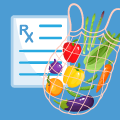A new study that models the combined effects of a sugar-based tax on beverages and targeted subsidies for minimally processed foods and drinks found that under these policies, low-income consumers would purchase less sugar-sweetened beverages and more fruits, vegetables, and healthier drinks, particularly in households without children. Researchers from the Global Food Research Program […]
More evidence that pandemic-era Healthy Helping program improved diet quality for North Carolinians with food insecurity

A new study published today in the November issue of Health Affairs underscores the positive impact of the Healthy Helping produce prescription program that provided North Carolinians facing food insecurity with $40 a month to spend on fruits and vegetables during the COVID-19 pandemic. Researchers from the University of North Carolina at Chapel Hill and […]
Healthy Helping program made fruits and vegetables affordable for North Carolinians during the COVID-19 pandemic

Low-income North Carolinians who received a monthly fruit and vegetable benefit during the COVID-19 pandemic enjoyed the flexibility to choose more and a greater variety of nutritious foods during a time of profound food insecurity, according to a new study in the Journal of Hunger & Environmental Nutrition. Researchers from UNC-Chapel Hill interviewed participants in […]
Increased WIC cash vouchers for fruits & vegetables have helped families eat healthier during COVID-19

Many U.S. families faced new or additional challenges to finding and paying for food during the COVID-19 pandemic. Among these are over 6 million women and young children who participate in the federal Special Supplemental Nutrition Program for Women, Infants, and Children (WIC), which provides nutrition education, supplemental foods, breastfeeding promotion and support, and referrals […]
Ng and colleagues awarded grant to explore cost savings from produce prescription programs

The Duke Endowment has awarded a $765,000 grant to Dr. Shu Wen Ng and colleagues Dr. Thomas Keyserling (UNC School of Medicine), Dr. Ashley Price (Duke University Department of Family Medicine and Community Health), and Neal Curran and Sam Hoeffler (Reinvestment Partners) to expand their research on the benefits of the food prescription programs. Administered […]
SuperSNAP helps food-insecure households afford healthy foods

Food insecurity is associated with a less healthy diet. While participation in the Supplemental Nutrition Assistance Program (SNAP — formerly known as food stamps) is known to reduce food insecurity, beneficiaries may still struggle to afford enough healthy foods. To address the cost of healthy food to improve health outcomes for SNAP recipients, the National […]